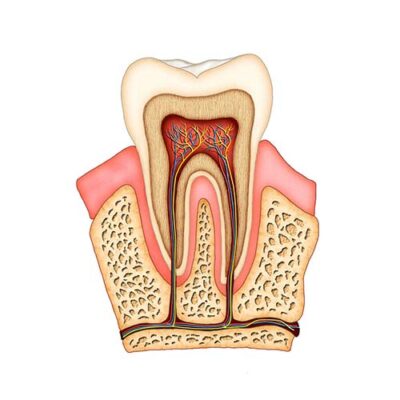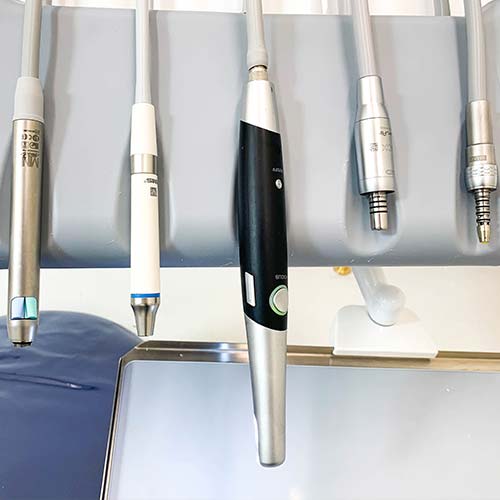Root Canal Treatment
Sensitive teeth and recurring tooth pain could be a sign of an infected or irritated nerve.
What is a root canal?
Root Canal treatment is the removal of infected, irritated and painful nerve tissue that exists in the root of the tooth. Without the removal of this tissue, an abscess, resulting in more acute pain, will inevitably occur.
Root canal is an extremely successful procedure with success rates being as high as 95%. The tooth is often able to last as long as teeth that have not been treated.

Why is root canal treatment performed?
Traditionally, serious tooth infections or critically decayed teeth were extracted, leaving a gap or requiring a denture. However, most teeth in these conditions can be saved using root canal treatment, making tooth extraction a last resort option. It is always better to preserve the natural tooth where possible.
What are the symptoms of root canal?
There are multiple indications that a tooth may require root canal treatment. These include:
- Erratic aching or throbbing when biting foods
- Increased sensitivity to hot and cold food or drink
- Extreme decay or an injury that generates an abscess (infection) in the bone.
Is root canal treatment painful?
If treated promptly, the root canal procedure can be pain-free through the use of local anaesthetic. It is possible that patients may suffer from some pain after their first or second root canal appointment if the infection has existed for a long time or if there is an abscess. However, you will be provided with advice on how to reduce this discomfort, including possible antibiotics or prescribed analgesics.
Following a root canal, the tooth, while still being receptive to biting forces, will have limited or no sensation towards hot or cold beverages, food and sweets.
The root canal vs tooth extraction debate
There is debate amongst dental professionals on the benefits of root canal treatment over tooth extraction. Our focus is on the holistic health and well-being of our patients and Dr Finkelstein has conducted a lot of research on this topic. As a result, we believe it’s better to save a tooth through root canal therapy and avoid the long-term effects of removing teeth which impacts a person’s ability to eat properly in old age.
The techniques used today almost avoid the occasional side effects of root canal infection. Still, each person is different so we will always present options to patients which we feel is in their health interests.
Your Root Canal Treatment with Dr Finkelstein
Step 1
Accessing the root canal
You will receive a local anaesthetic. A tiny hole is then created in the top of the tooth to gain access to the sensitive and infected nerve tissue inside the tooth.
Step 2
Nerve tissue removal (first visit)
The infected and sensitive nerve tissue within the root canal is removed. the canals are treated with an antibiotic paste. A cotton ball is placed inside the access hole and covered with a temporary filling material. This allows easier access at the next visit and seals the tooth from infection.
Step 3
Cleaning & remodelling
At the next visit the root canal is cleaned and re-shaped to make way for a specialised root canal filling substance.
Step 4
Filling
The re-shaped canals are filled with a plastic substance called gutta percha. This step is used to avoid possible future infections. A composite resin core is placed inside the access hole
Step 5
Crown
It is strongle recommended that all root treated teeth have a protective crown placed as root treated teeth are more prone to fractures.


Post-Operative Care for Root Canal Therapy
Discomfort
Discomfort after a root canal treatment can occur due to the irritation of bone around the tooth. This pain can either be mild or severe in some cases. Any pain should reach its peak within 48-72 hours and then slowly decrease. It is advised to avoid biting or chewing on the treated tooth for at least 2-3 days following the treatment.
Throbbing Sensation
You may experience a throbbing sensation in your tooth. If this occurs, it is recommended that you keep your head and neck raised as much as possible and use one or two extra pillows to sleep on to keep your head elevated.
Swelling
If you experience swelling of your gum, rinse your mouth with a warm salt-water solution approximately every 1-2 hours. This solution can be made by combining a teaspoon of salt with warm water. If you notice swelling of your face, apply ice to the swollen area for approximately 5 minutes ever half an hour.
Medication
If you have been prescribed antibiotic medication for infection, continue to take it as advised. It is essential that you complete the whole course of antibiotics. However, if you experience any side effects, which may include a rash, gastric disruption or any trouble breathing, stop the antibiotics immediately and call our office or visit a local doctor. We will provide advice on any pain medication required after treatment, this however may affect the ability to drive or operate machinery.
Costs of root canal therapy
The cost of root canal treatment can vary from patient to patient due to the different treatment options. Book an initial consultation with us so we can present all of the available options and costs involved.
Payment Options at Dr Finkelstein Dentist
- Visa & Mastercard - We do not charge you merchant fees on credit cards.
- Health Funds - We offer pay-the-gap only when you bring your health fund card along.
- Zip Payments - Get treated now, pay later!
Have you been told you need a root canal?
Get a professional diagnosis with Dr. Finkelstein to consider all your options.
Please complete the below form to chat with one of our friendly team. Once we receive your message, we will be in touch to answer any questions you have and book you in for an appointment. Alternatively, you can call us on (02) 9262 7778 or use our Online Chat between 8:00am until 5:00pm, Monday to Friday.
Get into the Finkelstein Files

Teeth Whitening 101: Professional vs. At-Home Options and What Really Works
Feeling like your smile could use a little extra shine? Join the club! Whether it’s that morning coffee habit or the occasional glass of red,

Root Canals Explained: Why They’re Not as Scary as You Think
Ever felt that sharp pang in your tooth like a lightning bolt of pain? No one signs up for that. When your dentist mentions a

Transform Your Smile: The Ultimate Guide to Dental Veneers in Sydney
Are you tired of hiding your smile behind closed lips, or worse, awkward hand poses? Let’s face it: we all want that Hollywood grin without

